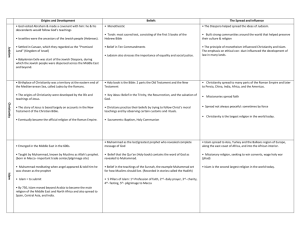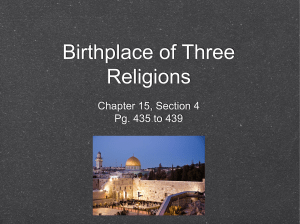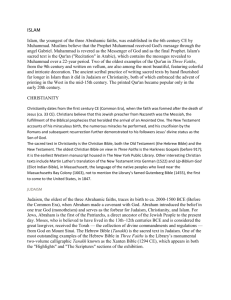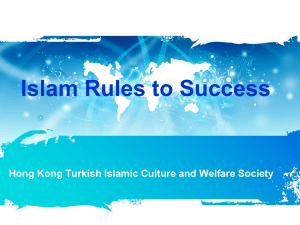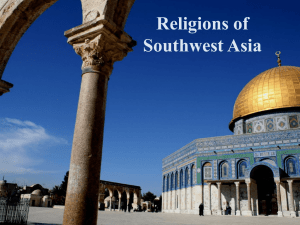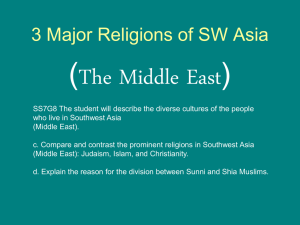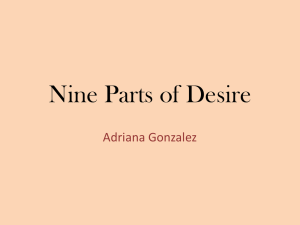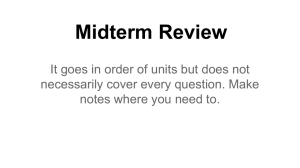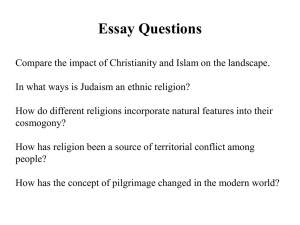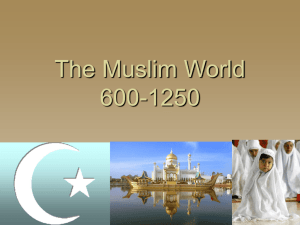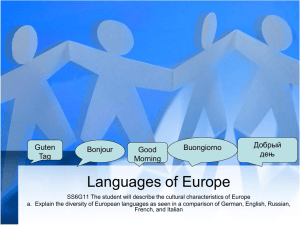Three World Religions - Worship, Downtown (in Cobourg)
advertisement
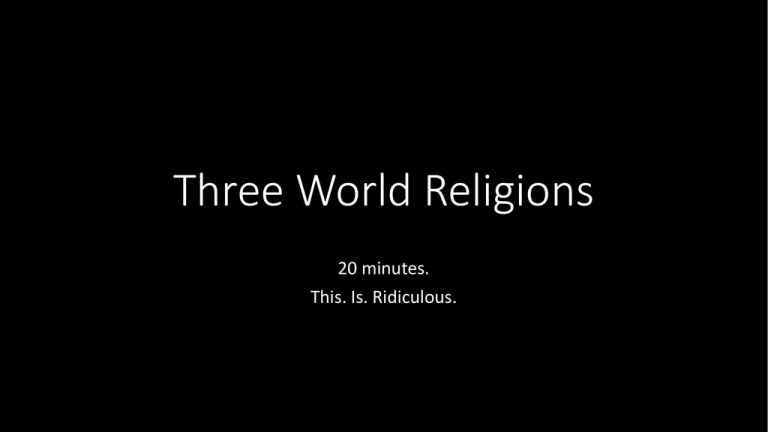
Three World Religions 20 minutes. This. Is. Ridiculous. Judaism - Overview - The most powerful god created the world - This god is named ( יהוהYahweh) The name of this god is not to be said, so when it occurs in the Hebrew text of the sacred writings, its consonants are pointed with the vowel symbols for the word אֲ דֹנָי, ‘Adonai’. The consonants YHWH with the vowels a-o-ai yield YaHoWeH, which where the name ‘Jehovah’ comes from. - This god selected the children of Abraham to be His special people. - They are to live their lives in obedience to His commandments. - They are favoured over all other peoples. Judaism - History - King Josiah b. 649 BC. Reigns from 641. - He orders a renovation of the Temple in Jerusalem in yr 18 of his rule - The Chief Priest, Hilkiah, finds a scroll “The Book of the Law” among the things in the Treasure Room. - Hilkiah brought this scroll to Josiah's attention, and the king was greatly alarmed lest the calamities threatened in the book for nonobservance of its commands should come upon him and his people. He sent to consult the prophetess Huldah, who assured him that the evil foretold would indeed come, but not in his day; "because," she said, "thine heart was tender and thou didst humble thyself before the Lord." An assembly of the elders of Judah and Jerusalem and of all the people was called, and the ancient covenant with Yahweh was renewed. Judaism - History - The king then set himself to the task of cleansing the land from idolatry. Josiah encouraged the exclusive worship of Yahweh and outlawed all other forms of worship. The Temple in Jerusalem was purged by the removal of the instruments and emblems of the worship of Baal and "the host of heaven," introduced by Manasseh. Then the corrupt local sanctuaries, or High Places, were destroyed, from Beer-sheba in the south to Beth-el and the cities of Samaria in the north. Josiah had living pagan priests executed and even had the bones of the dead priests of Bethel exhumed from their graves and burned on their altars, which was viewed as an extreme act of desecration. Josiah also reinstituted the Passover celebrations. • It is impossible to tell what Hilkiah “found”, but … • The Hebrew Bible does show clear signs of many hands editing and redacting the texts for historical and theological reasons. • Scholars believe that at least four “schools” have had a go at reshaping the stories found in the first Five Books (cf. Julius Wellhausen and others, “Documentary Hypothesis”) Judaism – now. Judaism is a major world religion, and social movement. The culture and religion support the generalization that Jewish people are industrious and successful. “Since the mass immigration some 100 years ago, Jews have become richest religious group in American society. They make up only 2% of US population, but 25% of 400 wealthiest Americans.” - Tani Goldstein, ynetnews.com Christianity - Overview - In 1st century Palestine, an eremitic prophet named John preaches a coming Kingdom in which God will reign. He runs afoul of the political authorities and is beheaded. - One of his followers, named Yeshua bar Joseph, takes up the torch. - Yeshua, in addition to preaching and baptizing, has the gift of healing. Many come to him to hear his teaching, and to be healed. Other miracles, signs and wonders accompany his message. - Yeshua runs afoul of the authorities, and is crucified, a Roman criminal punishment. - The followers of Yeshua experience him as alive, proclaim his resurrection from the dead, overcome their cultural reticence, and begin to spread the news. Christianity - Belief - The religion of Jesus (the coming Kingdom of his ‘Abba’ (Father)) transforms into a religion about Jesus. He becomes identified with the ‘son of man’ from the Hebrew scriptures. The Hebrew scriptures are reinterpreted by his followers to find “the Face of Christ” in them, and the early gathering of his followers begins the work of creating a theology of him as the Son of God. Gospels are written that prtray his ministry and his teaching, while reinforcing the message that he is the fulfillment of many prophecies from the Hebrew scriptures. - As the church spreads and grows, it encounters gentile culture and adapts. Until the fourth century there are many “christianitys” competing for acceptance and adherents. Christianity - Belief - From 325 AD Christianity was tolerated in the East and West of the Roman Empire. - Christianity became a state-sponsored cult in 380 AD when Emperor Theodosius I made Nicene Christianity the official religion of the Empire. - Preoccupation with orthodoxy / heresy - Split in 1054 (The Great Schism) between the Eastern and Western churches - Consolidation of papal power in the West - Historic Patriarchates in the East • In the West, identification between spiritual and temporal authority becomes greater and greater, as the church becomes a means of spiritual control over the population and its leaders. • The Coming Kingdom of God forecast by John the Baptist and Yeshua (Jesus) becomes identified with the power and glory of The Vatican. • In the 15th and 16th centuries, the Roman Catholic Church suffers a back-to-roots movement. Across the West kings and princes attempt to co-opt this theological renaissance for their own purposes, with differing degrees of success. Christianity – now. • The East-West schism of 1054 may be healed, as the parties are now in dialogue. • Churches are struggling to escape identification with the political authorities that have historically sponsored them. ie. Christianity has been a willing tool of Western imperialism, with uneven results. • Many denominations, and many claiming exclusive truth • The relationship between Christian practice and its holy texts is uneasy a lot of the time • Because Christians believe in continuing revelation through the inspiration of the Holy Spirit, the religion is uncommonly adaptable to new cultures and a changing society. • It faces irrelevance as universal literacy and the rights of the individual create a situation where the church must validate and substantiate its claims. Islam - Overview - Muhammad, an Arab businessman on retreat, in a cave near Mecca, receives a revelation in 610 AD in the month of Ramadan - Over the next two years, he receives more revelations - The Quran was revealed to Muhammad verse by verse, surah by surah during the next twenty-one years, often in response to a crisis or a question that had arisen in the little community of the faithful. (Karen Armstrong) - Muhammad begins making converts to the revelation. - There are five pillars: The Creed, The Daily Prayers, Almsgiving, Fasting during Ramadan, and the Pilgrimage to Mecca Islam - Belief - For the first two years, Muhammad kept quiet about his experience. He had new revelations, but confided only in his wife Khadija and her cousin Waraqa ibn Nawfal, a Christian. Both were convinced that these revelations came from God, but it was only in 612 that Muhammad felt empowered to preach, and gradually gained converts: his young cousin Ali ibn Abi Talib, his friend Abu Bakr, and the young merchant Uthman ibn Affan from the powerful Umayyad family. Many of the converts, including a significant number of women, were from the poorer clans; others were unhappy about the new inequity in Mecca, which they felt was alien to the Arab spirit. Muhammad's message was simple. He taught the Arabs no new doctrines about God: Islam - Belief - most of the Quraysh were already convinced that Allah had created the world and would judge humanity in the Last Days, as Jews and Christians believed. Muhammad did not think that he was founding a new religion, but that he was merely bringing the old faith in the One God to the Arabs, who had never had a prophet before. It was wrong, he insisted, to build a private fortune, but good to share wealth and create a society where the weak and vulnerable were treated with respect. If the Quraysh did not mend their ways, their society would collapse (as had other unjust societies in the past) because they were violating the fundamental laws of existence. (Karen Armstrong) • The Qu’ran is not translated. The faithful learn Arabic to read it. • Because Muhammad is the final prophet of Allah, there will be no new revelation. The work now is to spread the revelation around the world and bring the world into submission (‘Islam’) to the will of Allah. Islam – now. • Two major branches, at war with one another . A small number of other groups claiming faithfulness but with different practices. • It is not unfair to characterize the history and spread of Islam as violent. • Because Islam is the final word of god’s final prophet, dissent is blasphemy. • Objects of criticism include the morality of the life of Muhammad, the last prophet of Islam, both in his public and personal life. Issues relating to the authenticity and morality of the Qur'an, the Islamic holy book, are also discussed by critics. Other criticisms focus on the question of human rights in modern Islamic nations, and the treatment of women in Islamic law and practice. In wake of the recent multiculturalism trend, Islam's influence on the ability of Muslim immigrants in the West to assimilate has been criticized. (Wikipedia) Conclusions, Questions, Discussion
